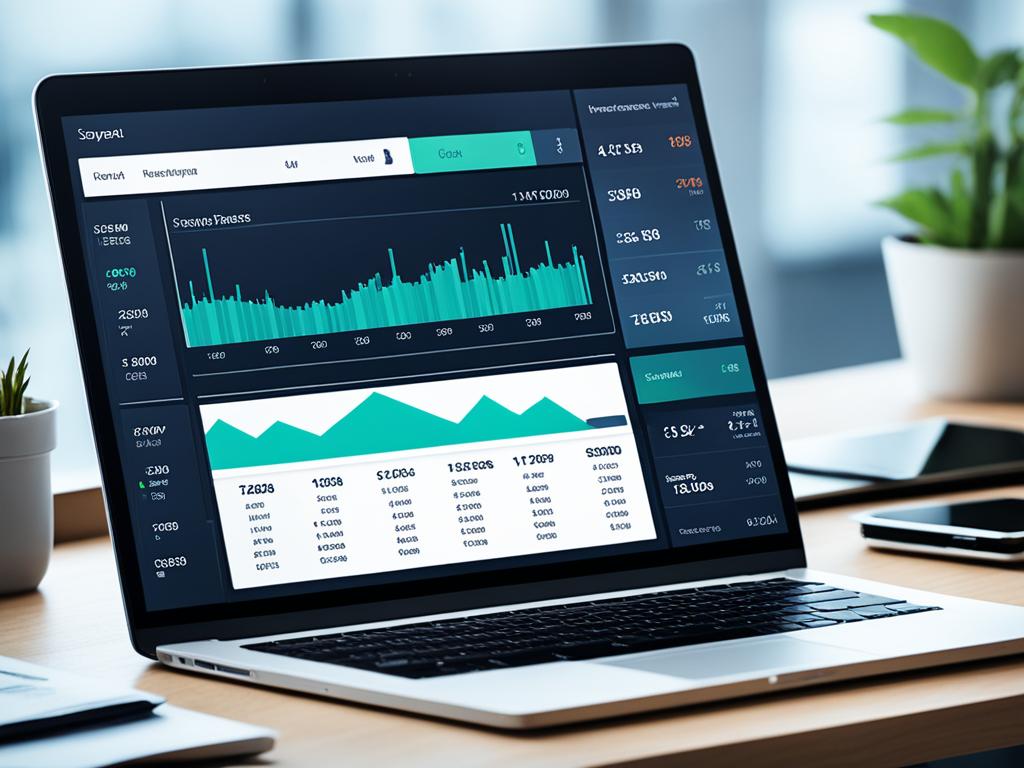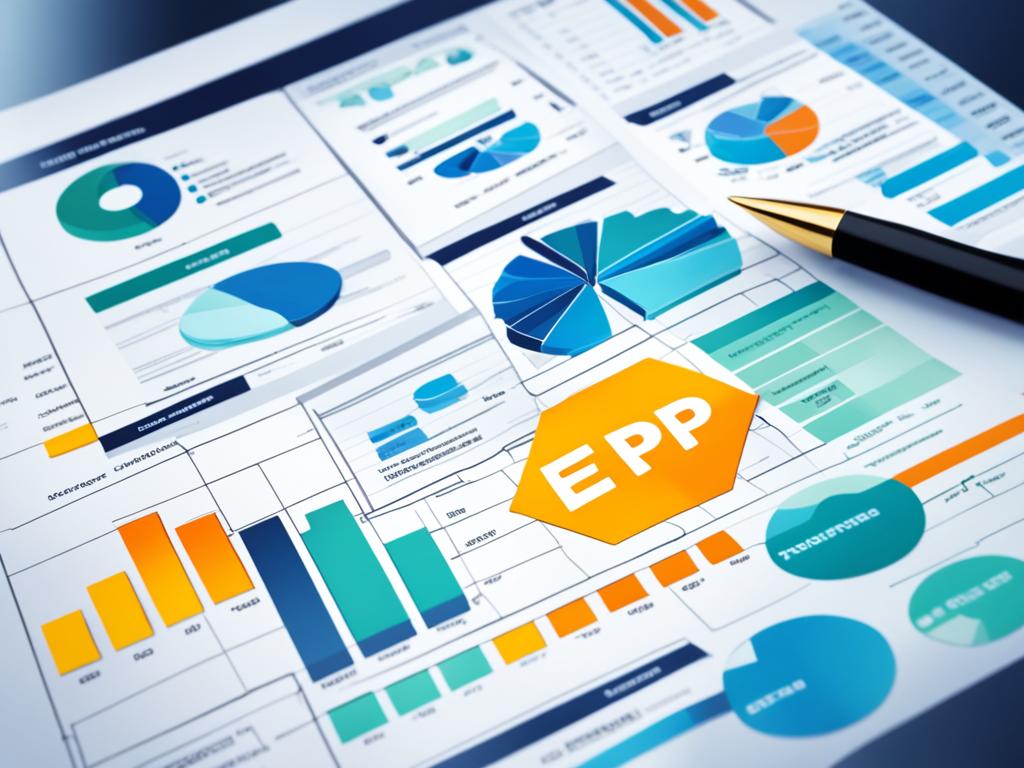While many companies still wrestle with the shortcomings of spreadsheets for essential financial processes, a seismic shift is quietly taking place. A staggering 82% of financial teams report that they have moved beyond simple spreadsheets, embracing ERP Software for Financial management —a comprehensive tool that seamlessly blends financial planning and analysis ERP, budgeting ERP, forecasting ERP, and more into one robust system. This move signals a pivotal shift from manual data entry and its inherent inaccuracies and compliance risks to an integrated approach that enhances both decision-making and productivity.
As businesses strive for growth, the demand for sophisticated treasury management ERP, investment management ERP, and risk management ERP has never been higher. Fostering a financial landscape with these advanced capabilities ensures that the core financial management processes are not only streamlined but also primed for strategic scaling.
Key Takeaways
- Implementation of ERP Software for Finance significantly reduces the risks and errors associated with manual spreadsheets.
- Financial planning and analysis ERP is integral for data-driven decision-making and improving productivity.
- Budgeting ERP tools are essential for accurate financial forecasting and resource allocation.
- Investment management and treasury management ERP systems play a pivotal role in optimizing financial assets and cash flow.
- Risk management ERP is critical in identifying and mitigating financial risks in real-time.
- ERP systems enable a strategic approach to overall business performance and growth.
The Critical Role of ERP in Enhancing Financial Strategy
When considering the transformative impact of ERP software on financial strategy, it’s essential to understand what is ERP software in its core functionality. Unlike traditional accounting systems, ERP software serve as the backbone for not just financial transactions but also integrate pivotal aspects of a business’s operations. This kind of software ensures seamless synchronization between finance, inventory control, supply chain management, and CRM — components that collectively fortify the financial foundation of any enterprise.
Take SAP ERP software, for example, renowned for its capability to consolidate disparate business processes into a coherent, efficiently managed workflow. Here lies the true ERP software meaning: a comprehensive, versatile tool that enhances financial data accuracy and provides strategic insights. Given that 64% of businesses are poised to adopt enterprise resource planning (ERP) software within a few years, it underscores the essential role ERP systems play in upgrading industry-specific financial operations.
Investment in an ERP system is more than an upgrade from conventional software—it’s a strategic move towards sophisticated, interconnected business management. The data generated by an ERP allows for a multi-dimensional view of a company’s financial health, informing better strategic decisions.
- Streamlined financial operations
- Enhanced real-time data analysis and reporting
- Integration of various business processes under one system
- Improved efficiency and productivity
For those just beginning to explore the boundless potential of ERP systems, here’s a comparative analysis of common financial strategies with and without the use of ERP:
| Financial Activity | With Traditional Systems | With ERP Software |
|---|---|---|
| Accounts Payable/Receivable | Often manual and paper-based | Automated tracking and workflows |
| Invoicing | Error-prone, time-consuming | Efficient, accurate, and faster processes |
| Financial Reporting | Static reports with potential inaccuracies | Dynamic, real-time accurate financial reporting |
| Supply Chain Management | Disconnected from financial data | Fully integrated with financial performance |
As the above table illustrates, the adoption of an ERP software marks a significant transition from reactive, disjointed financial management, towards proactive and strategic financial steering. Ultimately, it’s not just about upgrading software, but adopting a more resilient and forward-thinking financial strategy.
Transitioning from Basic Accounting to ERP Software for Financial Management
When it comes to managing a company’s financials, the shift from traditional accounting practices to sophisticated erp accounting software not only signifies modernization but also an enhanced capacity for strategic financial management. By integrating various accounting and financial processes, companies can tap into the every-growing power of systems like Oracle ERP software and other manufacturing erp software to streamline their operations.

I’ve seen firsthand how the right software erp can transform the financial management of businesses, irrespective of size or industry. The question, “what is an erp software?,” no longer merely addresses the need for an accounting tool; instead, it seeks a comprehensive solution for real-time financial oversight and strategic planning.
Selecting the best erp software relies heavily on understanding the core functionalities that it brings to the financial table. From sophisticated forecasting models to detailed risk assessments, these features are enablers for informed decision-making:
| Feature | Description | Benefits |
|---|---|---|
| General Ledger (GL) | Central repository for accounting data. | Provides the backbone for all financial information and reporting. |
| Balance Sheets | Snapshot of financial position at a specific point in time. | Crucial for financial analysis and assessing company health. |
| Accounts Payable (AP) | Management of money owed by the business to suppliers. | Improves cashflow management and creditor relations. |
| Accounts Receivable (AR) | Management of money owing to the business by customers. | Accelerates cash inflows and enhances collection processes. |
| Tax Management | Processing and compliance with tax obligations. | Reduces risk of penalties and ensures accurate tax filings. |
| Payroll Management | Comprehensive handling of employee compensation. | Ensures timely and accurate payments with tax and benefits considered. |
| Budgeting & Forecasting | Planning future financial performance. | Aids in strategic planning and financial goal setting. |
| Risk Monitoring & Reporting | Identification and assessment of financial risks. | Proactive risk management and mitigation strategies. |
Companies once tethered to cumbersome excel sheets and limited standalone financial software now revel in the multifold advantages of a comprehensive software erp ecosystem. A module deeply integrated within the broader ERP suite is no longer a luxury—it’s a necessary pivot for any business intent on accurate and strategic financial navigation in the digital age.
Integrating Financial Operations with ERP: A Strategic Choice
As companies evaluate the benefits of transitioning to sophisticated ERP software, the integration of financial operations emerges as a pivotal strategic choice. By opting for cloud ERP software, even small businesses can experience a significant uptick in stewardship of their financial data. The accuracy of financial reporting is paramount, and an ERP system enhances this precision substantially.

What’s more, the decision to define ERP software as the centerpiece of an organization’s financial ecosystem means embracing a centralized platform where all processes from procurement to project management peacefully coexist. Firms specializing in arena-specific applications, like construction ERP software, find themselves at an advantage, with a tool that understands and responds to their unique business models.
Here’s how leading ERP software companies are reinventing the financial operations landscape:
- Efficiency: Streamlined workflows allow for real-time data sharing and reduce redundant tasks.
- Productivity: Automation of routine tasks frees up human resources for strategic activities.
- Accuracy: Minimized human error leads to trustworthy financial data and compliance ease.
In conclusion, whether it’s a conglomerate seeking consolidation or a ERP software for small business aspiring for growth, the right ERP software serves as the crucial cog in the wheel of financial success. A system that integrates, analyzes, and reports every number with precision is not just a tool—it’s a financial revelation.
7 Best ERP software for Financial Management
I’ve discusses ERP systems that are useful for finance and accounting. It ranks the top seven as below based on my observation:
| Rank | ERP Software | Description | Focus | Strengths | Weaknesses |
| 7 | QuickBooks | Robust finance and accounting system | Smaller organizations | Flexibility, user-friendly interface | Lacks comprehensive features, not ideal for multinational organizations |
| 6 | Sage X3 | Comprehensive ERP system | Manufacturing and distribution organizations | MRP capabilities, efficient handling of general manufacturing and distribution processes | Less flexible, not ideal for operations, customer service, or sales functionalities |
| 5 | Microsoft D365 Business Central | Designed for smaller to mid-size organizations | Integrates with other Microsoft products | Familiar Microsoft look and feel, easy to use | May not be ideal for organizations that rapidly outgrow its capabilities |
| 4 | Workday | Legacy cloud system | HR and finance | Strong in both human capital management and financials, scalable | Less flexible, limited functionalities outside of HR and finance |
| 3 | Oracle NetSuite | SaaS-based product | Small and mid-sized organizations | User-friendly interface, strong in finance and accounting | Lacks flexibility, high long-term costs |
| 2 | SAP S/4HANA | Excellent fit for large multinational organizations | Scalability | Real-time access to financial data, strong in finance and accounting | Rigid, not ideal for operations, customer service, or sales functionalities |
| 1 | SAP Business One | Comprehensive ERP system | Manufacturing and distribution organizations | MRP capabilities, efficient handling of general manufacturing and distribution processes | Flexible, not ideal for operations or large corporates |
Scaling Your Business with Cloud-Based ERP Solutions
As businesses endeavor to reach new heights in a competitive market, the implementation of top erp software becomes a pivotal step in paving the way for growth and sustainability. My exploration of cloud-based ERP solutions reveals a landscape that offers pronounced benefits such as unparalleled flexibility and scalability.
The nature of cloud ERP enables seamless updates and enhancements, permitting a business to adapt to changing demands without the heavy burden of infrastructure investment. Furthermore, the advantage of remote accessibility ensures that decision-makers and staff can access critical real-time data anytime, anywhere.
In particular, distribution ERP software shines in optimizing the flow of goods from warehouses to markets, overcoming traditional barriers to efficiency. Meanwhile, ERP software for manufacturing integrates complex production processes, inventory management, and quality control into a unified system.
ERP is a boon for manufacturers aiming to streamline operations. Whether it’s an SME or a multinational company, ERP business software positions entities to manage financial health, resource allocation, and customer relationships with greater precision.
Adopting retail ERP software can turn the tides for retailers by harmonizing inventory management with point of sale (POS) systems and e-commerce platforms, offering a holistic view that can dramatically enhance the customer experience.
My assessment of these integrated platforms underlines their role in not just simplifying current workflows but also setting a solid foundation for future expansion. In short, cloud-based ERP is not just technology—it’s the strategic partner that carries your business forward in an ever-evolving market landscape.

